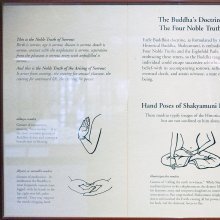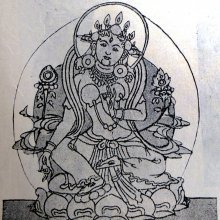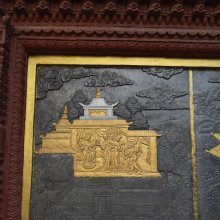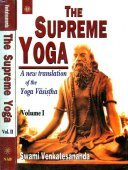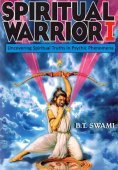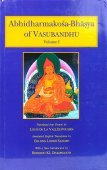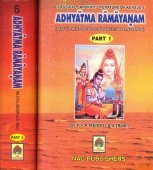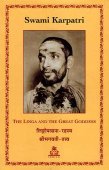Truth: 2 definitions
Introduction:
Truth means something in Hinduism, Sanskrit. If you want to know the exact meaning, history, etymology or English translation of this term then check out the descriptions on this page. Add your comment or reference to a book if you want to contribute to this summary article.
Images (photo gallery)
(+1 more images available)
In Hinduism
Vedanta (school of philosophy)
Source: ORA: Amanaska (king of all yogas): (Advaita Vedanta)The Truth (of the self) is denoted by the Sanskrit term Satya, according to the Māṇḍūkyopaniṣatkārikā 3.31-32.—Accordingly, while discussing duality and mental activity: “All this duality which is [comprising of] whatever is moving and motionless is [just] a visible object of the mind. For when [the state of] no-mind of mind [arises], duality is not perceived. [Why is this?] When the mind does not conceptualize because [one has] realized the truth (satya) of the self, then, it goes to the state of no mind. Therefore, in the absence of perceivable objects, there is no perception [of duality]”.

Vedanta (वेदान्त, vedānta) refers to a school of orthodox Hindu philosophy (astika), drawing its subject-matter from the Upanishads. There are a number of sub-schools of Vedanta, however all of them expound on the basic teaching of the ultimate reality (brahman) and liberation (moksha) of the individual soul (atman).
General definition (in Hinduism)
Source: Shodhganga: Elements of Art and Architecture in the Trtiyakhanda of the Visnudharmottarapurana (h)Truth (and spiritual knowledge) can be developed in Hindu temples which ultimately serve to connect man and the divine.—The temple is a place where the devotees can get the environment to connect themselves with their lords. The Hindu temple consists of all the cosmic elements from fire to water, images of nature to deities, Gods remain feminine to masculine, kāma to artha, fleeting sounds and incense smells etc. by which one can celebrate life. Stella Kramrisch, the author of The Hindu Temple also keeps her view point in the same spirit. The Hindu temples are designed for the purpose of making connection between man and the divine and to help the people to develop their spiritual knowledge and truth.
See also (Relevant definitions)
Starts with: Truth of Arising, Truth of Cessation, Truth of Suffering, Truth of the Path, Truthfulness in action, Truthfulness in activity, Truthfulness in mind.
Ends with: Noble Truth, Relative Truth, Supreme truth.
Full-text (+2200): Satya, Paramartha, Tattva, Siddhanta, Tattvajnana, Saiddhantika, Tathya, Four Noble Truths, Sacca, Satyavrata, Satyavadin, Satyakama, Raddhanta, Rita, Satyanrita, Paramarthika, Avitatha, Tattvartha, Arthatattva, Apalapa.
Relevant text
Search found 508 books and stories containing Truth; (plurals include: Truths). You can also click to the full overview containing English textual excerpts. Below are direct links for the most relevant articles:
The Buddhist Path to Enlightenment (study) (by Dr Kala Acharya)
2(a). The Four Noble Truths < [Chapter 3 - Seven Factors of Enlightenment and Noble Eightfold Path]
2(b). The Noble Eightfold Path (Ariya-aṭṭhaṅgika-magga) < [Chapter 3 - Seven Factors of Enlightenment and Noble Eightfold Path]
1.3.4. Dhammānupassanā–Contemplation Of The Dhamma < [Chapter 2 - Five Groups of Factor]
Visuddhimagga (the pah of purification) (by Ñāṇamoli Bhikkhu)
B. Description of the Truths (sacca) < [Chapter XVI - The Faculties and Truths (indriya-sacca-niddesa)]
General (conclusion to the faculties and truths) < [Chapter XVI - The Faculties and Truths (indriya-sacca-niddesa)]
Introduction (the eight knowledges) < [Chapter XXI - Purification by Knowledge and Vision of the Way]
A Discourse on Paticcasamuppada (by Venerable Mahasi Sayadaw)
Chapter 14 - The Four Noble Truths In Brief < [Part 10]
Chapter 12 - Sammasambuddha < [Part 10]
Chapter 6 - Difficulty Of Understanding < [Part 1]
The Great Chronicle of Buddhas (by Ven. Mingun Sayadaw)
Part 13 - The Buddha’s Discourse on The Four Ariya Truths < [Chapter 40 - The Buddha Declared the Seven Factors of Non-Decline for Rulers]
Part 16 - Notes on the Dhammacakka-pavattana Sutta < [Chapter 42 - The Dhamma Ratanā]
Buddha attributes (2): Sammāsambuddha < [Chapter 42 - The Dhamma Ratanā]
The View From the Center (by Ajahn Amaro)
The Buddha (by Piyadassi Thera)
Related products
(+10 more products available)
